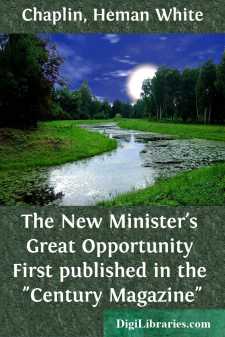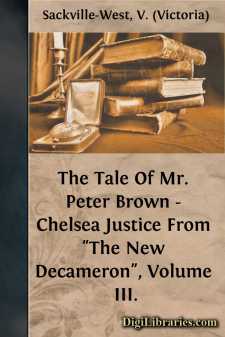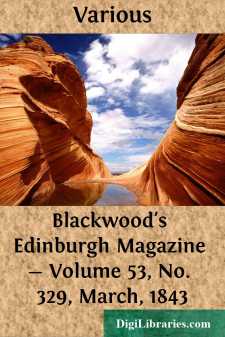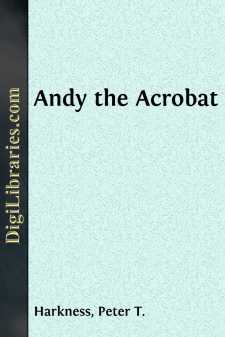Fiction
- Action & Adventure 180
- Biographical 15
- Christian 59
- Classics 6965
- Coming of Age 5
- Contemporary Women 3
- Erotica 8
- Espionage/Intrigue 12
- Fairy Tales, Folklore & Mythology 236
- Family Life 169
- Fantasy 117
- Gay 1
- General 596
- Ghost 32
- Historical 808
- Horror 43
- Humorous 160
- Jewish 25
- Legal 4
- Medical 22
- Mystery & Detective 315
- Political 49
- Psychological 41
- Religious 64
- Romance 159
- Sagas 11
- Science Fiction 730
- Sea Stories 113
- Short Stories (single author) 537
- Sports 10
- Suspense 1
- Technological 8
- Thrillers 2
- Urban Life 31
- Visionary & Metaphysical 1
- War & Military 173
- Westerns 199
Fiction Books
Sort by:
THE CLOCKMAKER OF POISSY. Foreseeing that some who do not love me will be swift to allege that in the preparation of these memoirs I have set down only such things as redound to my credit, and have suppressed the many experiences not so propitious which fall to the lot of the most sagacious while in power, I take this opportunity of refuting that calumny. For the truth stands so far the other way that...
more...
"The minister's got a job," said Mr. Snell. Mr. Snell had been driven in by a shower from the painting of a barn, and was now sitting, with one bedaubed overall leg crossed over the other, in Mr. Hamblin's shop. Half-a-dozen other men, who had likewise found in the rain a call to leisure, looked up at him inquiringly. "How do you mean?" said Mr. Noyes, who sat beside him, girt...
more...
Sometimes, I know, I must seem a crotchety old man. "Old John Hanson," they call me, and roll their eyes as though to say, "Of course, you have to forgive him on account of his age." But the joke isn't always on me. Not infrequently I gain much amusement observing these cocky youngsters who strut in the blue-and-silver uniforms of the Service in which, until more or less recently,...
more...
CHAPTER I THE FACE OF HATE It was three o'clock in the morning. Along a deserted pavement of Riverside Drive strode briskly a young man whose square-set shoulders and erect poise suggested a military training. His coat, thrown carelessly open to the cold night wind, displayed an expanse of white indicative of evening dress. As he walked his heels clicked sharply on the concrete with the forceful...
more...
THE first thing which attracted my attention to the man was the shock of white hair above the lean young face. But for this, I should not have looked twice at him: long, spare, and stooping, a shabby figure, he crouched over a cup of coffee in a corner of the dingy restaurant, at fretful enmity with the world; typical, I should have said, of the furtive London nondescript. But that white hair startled...
more...
by:
Randall Garrett
"I want you to put me in prison!" the big, hairy man said in a trembling voice. He was addressing his request to a thin woman sitting behind a desk that seemed much too big for her. The plaque on the desk said: LT. PHOEBE HARRISTERRAN REHABILITATION SERVICE Lieutenant Harris glanced at the man before her for only a moment before she returned her eyes to the dossier on the desk; but long enough...
more...
by:
Robert Sheckley
id the Pilot slowed the ship almost to a standstill, and peered anxiously at the green planet below. Even without instruments, there was no mistaking it. Third from its sun, it was the only planet in this system capable of sustaining life. Peacefully it swam beneath its gauze of clouds. It looked very innocent. And yet, twenty previous Grom expeditions had set out to prepare this planet for...
more...
by:
Various
CHAPTER I. "Be slow to offend—swift to revenge!" Inscription on a dagger of Daghestán. It was Djoumá. Not far from Bouináki, a considerable village of Northern Daghestán, the young Tartars were assembled for their national exercise called "djigÐÑtering;" that is, the horse-race accompanied by various trials of boldness and strength. Bouináki is situated upon two ledges of...
more...
by:
Virgil Finlay
CHAPTER 1When shall we three meet againIn thunder, lightning, or in rain?When the hurlyburly's done.When the battle's lost and won.—MacbethENTER THREE HUSSARS My name is Greta Forzane. Twenty-nine and a party girl would describe me. I was born in Chicago, of Scandinavian parents, but now I operate chiefly outside space and time—not in Heaven or Hell, if there are such places, but not in...
more...
CHAPTER I EXPELLED "Andrew Wildwood!" The village schoolmaster of Fairview spoke this name in a tone of severity. He accompanied the utterance with a bang of the ruler that made the desk before him rattle. There was fire in his eye and his lip trembled. Half of the twenty odd scholars before him looked frightened, the others interested. None had ever before seen the dull, sleepy pedagogue so...
more...











